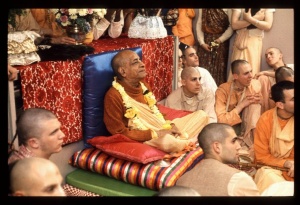CC Antya 5.65: Difference between revisions
m (1 revision(s)) |
(Vanibot #0054 edit - transform synonyms into clickable links, which search similar occurrences) |
||
| (One intermediate revision by one other user not shown) | |||
| Line 1: | Line 1: | ||
{{ | [[Category:Sri Caitanya-caritamrta - Antya-lila Chapter 05]] | ||
<div style="float:left">'''[[Sri Caitanya-caritamrta|Śrī Caitanya-caritāmṛta]] - [[CC Antya|Antya-līlā]] - [[CC Antya 5|Chapter 5: How Pradyumna Miśra Received Instructions from Rāmānanda Rāya]]'''</div> | |||
<div style="float:right">[[File:Go-previous.png|link=CC Antya 5.64|Antya-līlā 5.64]] '''[[CC Antya 5.64|Antya-līlā 5.64]] - [[CC Antya 5.66|Antya-līlā 5.66]]''' [[File:Go-next.png|link=CC Antya 5.66|Antya-līlā 5.66]]</div> | |||
{{CompareVersions|CC|Antya 5.65|CC 1975|CC 1996}} | |||
{{RandomImage}} | |||
==== TEXT 65 ==== | ==== TEXT 65 ==== | ||
<div | <div class="verse"> | ||
vaktā śrotā kahe śune duṅhe premāveśe | :vaktā śrotā kahe śune duṅhe premāveśe | ||
ātma-smṛti nāhi, kāhāṅ jāniba dina-śeṣe | :ātma-smṛti nāhi, kāhāṅ jāniba dina-śeṣe | ||
</div> | </div> | ||
| Line 12: | Line 16: | ||
==== SYNONYMS ==== | ==== SYNONYMS ==== | ||
<div | <div class="synonyms"> | ||
''[//vanipedia.org/wiki/Special:VaniSearch?s=vaktā&tab=syno_o&ds=1 vaktā]'' — the speaker; ''[//vanipedia.org/wiki/Special:VaniSearch?s=śrotā&tab=syno_o&ds=1 śrotā]'' — the listener; ''[//vanipedia.org/wiki/Special:VaniSearch?s=kahe&tab=syno_o&ds=1 kahe]'' — speaks; ''[//vanipedia.org/wiki/Special:VaniSearch?s=śune&tab=syno_o&ds=1 śune]'' — hears; ''[//vanipedia.org/wiki/Special:VaniSearch?s=duṅhe&tab=syno_o&ds=1 duṅhe]'' — both of them; ''[//vanipedia.org/wiki/Special:VaniSearch?s=prema&tab=syno_o&ds=1 prema]-[//vanipedia.org/wiki/Special:VaniSearch?s=āveśe&tab=syno_o&ds=1 āveśe]'' — in ecstatic love; ''[//vanipedia.org/wiki/Special:VaniSearch?s=ātma&tab=syno_o&ds=1 ātma]-[//vanipedia.org/wiki/Special:VaniSearch?s=smṛti&tab=syno_o&ds=1 smṛti] [//vanipedia.org/wiki/Special:VaniSearch?s=nāhi&tab=syno_o&ds=1 nāhi]'' — there was no bodily consciousness; ''[//vanipedia.org/wiki/Special:VaniSearch?s=kāhāṅ&tab=syno_o&ds=1 kāhāṅ]'' — where; ''[//vanipedia.org/wiki/Special:VaniSearch?s=jāniba&tab=syno_o&ds=1 jāniba]'' — can understand; ''[//vanipedia.org/wiki/Special:VaniSearch?s=dina&tab=syno_o&ds=1 dina]-[//vanipedia.org/wiki/Special:VaniSearch?s=śeṣe&tab=syno_o&ds=1 śeṣe]'' — the end of day. | |||
</div> | </div> | ||
| Line 19: | Line 23: | ||
==== TRANSLATION ==== | ==== TRANSLATION ==== | ||
<div | <div class="translation"> | ||
The speaker and listener spoke and heard in ecstatic love. Thus they forgot their bodily consciousness. How, then, could they perceive the end of the day? | The speaker and listener spoke and heard in ecstatic love. Thus they forgot their bodily consciousness. How, then, could they perceive the end of the day? | ||
</div> | </div> | ||
__NOTOC__ | |||
<div style="float:right; clear:both;">[[File:Go-previous.png|link=CC Antya 5.64|Antya-līlā 5.64]] '''[[CC Antya 5.64|Antya-līlā 5.64]] - [[CC Antya 5.66|Antya-līlā 5.66]]''' [[File:Go-next.png|link=CC Antya 5.66|Antya-līlā 5.66]]</div> | |||
__NOTOC__ | |||
__NOEDITSECTION__ | |||
Latest revision as of 20:42, 19 February 2024
Śrī Caitanya-caritāmṛta - Antya-līlā - Chapter 5: How Pradyumna Miśra Received Instructions from Rāmānanda Rāya

His Divine Grace
A.C. Bhaktivedanta Swami Prabhupada
A.C. Bhaktivedanta Swami Prabhupada
TEXT 65
- vaktā śrotā kahe śune duṅhe premāveśe
- ātma-smṛti nāhi, kāhāṅ jāniba dina-śeṣe
SYNONYMS
vaktā — the speaker; śrotā — the listener; kahe — speaks; śune — hears; duṅhe — both of them; prema-āveśe — in ecstatic love; ātma-smṛti nāhi — there was no bodily consciousness; kāhāṅ — where; jāniba — can understand; dina-śeṣe — the end of day.
TRANSLATION
The speaker and listener spoke and heard in ecstatic love. Thus they forgot their bodily consciousness. How, then, could they perceive the end of the day?